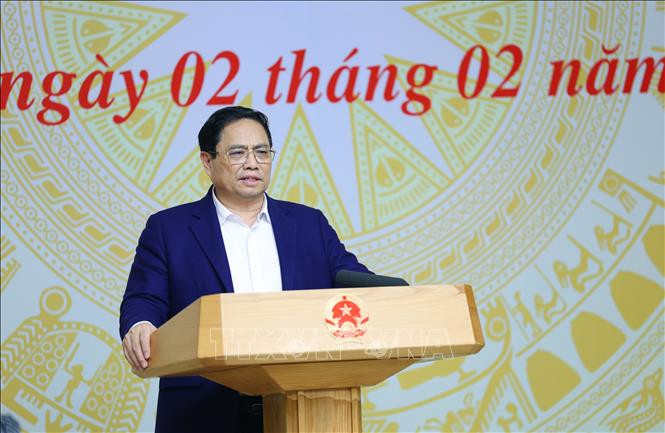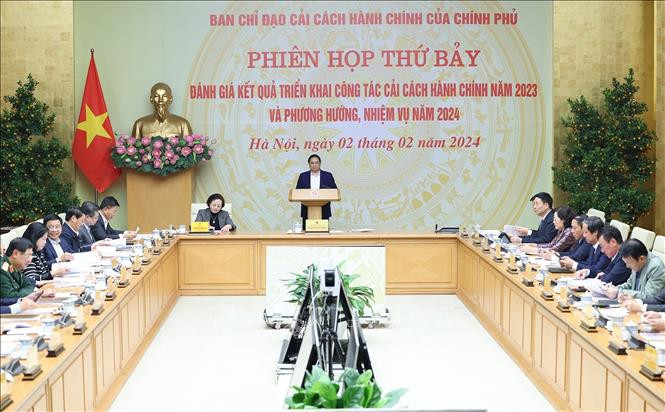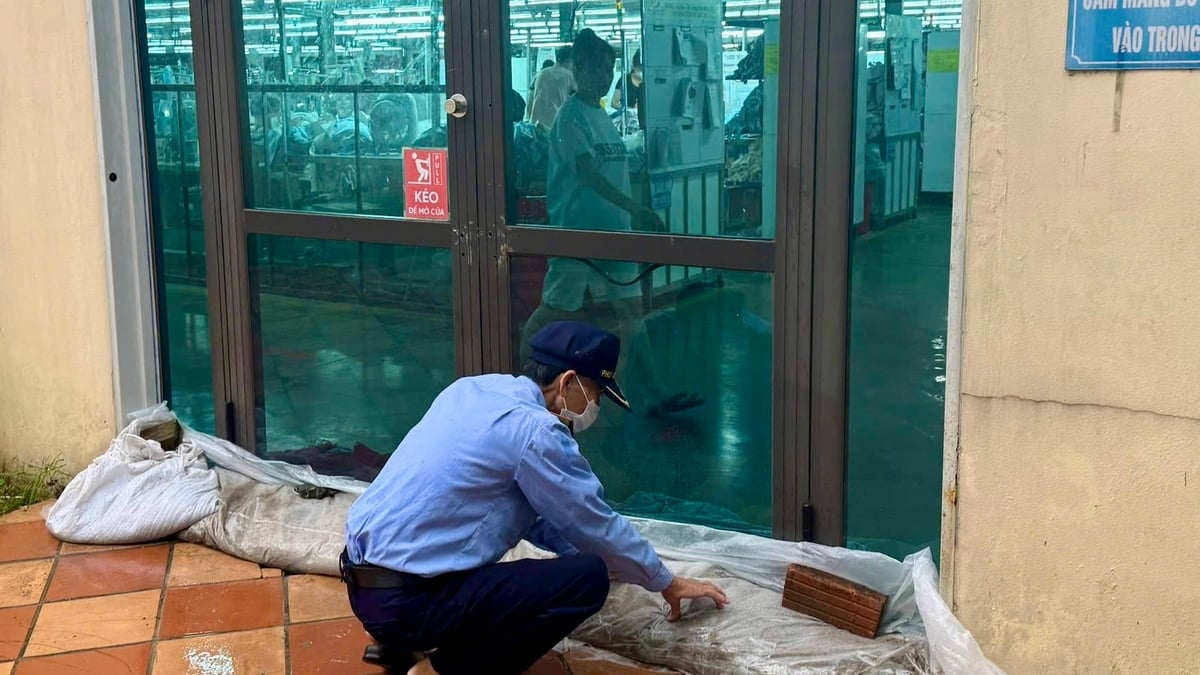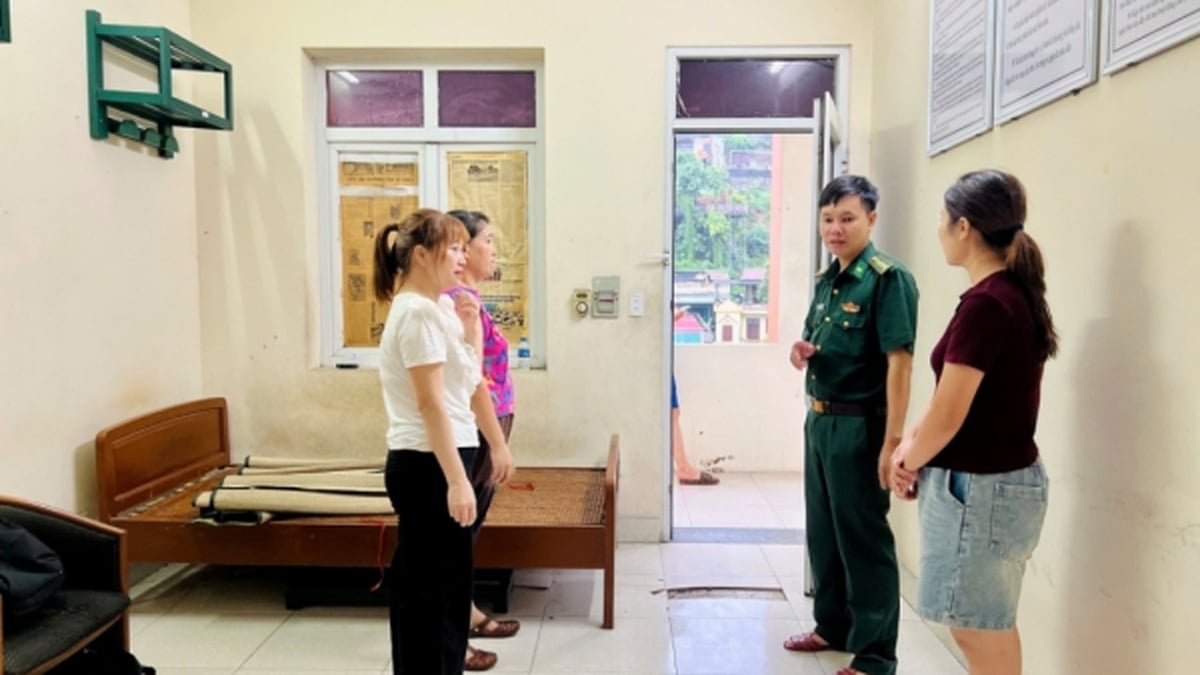
The meeting was held online between the Government headquarters and 63 provinces and centrally-run cities. Attending the meeting were Deputy Heads of the Steering Committee: Minister of Home Affairs Pham Thi Thanh Tra; Minister, Head of the Government Office Tran Van Son; leaders of ministries and branches who are members of the Steering Committee and Chairmen of People's Committees of provinces and cities.
Many institutional, mechanism and policy barriers are focused on being removed.
At the meeting, members of the Steering Committee, leaders of ministries, branches and localities discussed the results, limitations and causes of administrative reform in 2023; solutions to promote administrative reform in 2024 in 6 areas: institutional reform, administrative procedure reform, reform of the State administrative apparatus, reform of the civil service regime, public finance reform, building and developing e -Government and digital Government .
In institutional reform, the Government has organized 10 thematic meetings on law-making; ministries and branches have consulted and submitted to the Government for promulgation 92 Decrees and issued 372 Circulars under their authority; People's Councils and People's Committees at provincial level have issued 3,427 legal documents.
In 2023, the Prime Minister established 26 Administrative Procedure Reform Working Groups (Working Groups) to direct and urge ministries, branches and localities to implement and directly remove difficulties and obstacles for localities; strengthen the Steering Committee; organize many national conferences on planning, foreign investment, financial markets, real estate, etc. Many institutional, mechanism and policy barriers have been focused on removing.
The Prime Minister has approved a plan to cut and simplify 144 business regulations. Ministries and sectors have cut and simplified 628 business regulations in 53 legal documents, bringing the total number of business regulations cut and simplified from 2021 to present to 2,770 regulations; 14 ministries and sectors have implemented a plan to decentralize 86 administrative procedures, bringing the total number of administrative procedures decentralized from 2022 to present to 153/699 administrative procedures, reaching 21.9%.
Along with that, 9 ministries and branches have implemented the plan to simplify 147 administrative procedures and citizen papers related to population management, reaching 49.26%. To date, 22/22 ministries and branches have identified and announced 1,372 internal administrative procedures; 63/63 localities have announced the list of internal administrative procedures.
Implementing the one-stop, one-stop mechanism in handling administrative procedures, by the end of 2023, the rate of digitization of records and results of handling administrative procedures at ministries and branches will reach 28.59% and at localities will reach 39.48%. Records issued with electronic results with legal value for reuse at ministries and branches will reach 28.6% and at localities will reach 45.3%. In 2023, administrative procedure records resolved on time or early at ministries and branches will reach 30.60%; at localities will reach 90.75%.
Reform of the state administrative apparatus is being promoted. It is expected that by the end of 2024, the number of public service units under the management of ministries and branches will be 895, a decrease of 140 units compared to 2021; the autonomy of public service units will reach about 63%.
Localities have focused on reviewing and rearranging internal administrative organizations, thereby reducing 13 departments and other administrative organizations under the Provincial People's Committee; reducing 2,572 divisions and equivalent organizations under specialized agencies.
Regarding management and streamlining of staff, implementing Government decrees, from 2015 to December 15, 2023, the whole country will streamline staff by 84,140 people; of which 5,740 people will be at the central level and 78,400 people at the local level.
The work of reforming the civil service system, reforming public finance, building and developing e-Government and digital Government continues to achieve many important results. The number of electronic documents sent and received on the National Document Interconnection Axis in 11 months of 2023 is about 6.8 million documents...
However, the Steering Committee believes that the legal mechanisms and policies in some areas are still lacking in synchronization; administrative procedures still have problems affecting the investment and business environment and the provision of public services to people and businesses; there is a situation where a number of officials and civil servants are evasive, shirking responsibility, and lacking responsibility. The connection and two-way sharing of data from the information systems of ministries, branches, and localities with national databases is not yet smooth. The quality of some online public services provided to people and businesses is not high; the operation of the One-Stop-Shop in many places is not in accordance with regulations...
Concluding the meeting, reviewing the outstanding results of administrative reform in recent times, Prime Minister Pham Minh Chinh emphasized that promoting administrative reform and building a state administration that serves the people, is professional, effective and efficient, and has always been identified by the Party and State as a focus and strategic breakthrough in building a socialist rule-of-law state in our country.
Over the past year, with the attention and close and drastic direction of the entire political system, the Government, the Prime Minister, along with the efforts of the members of the Steering Committee, all levels, sectors and localities, administrative reform has had very positive changes and achieved comprehensive results.
The Prime Minister pointed out 8 outstanding results. In particular, many important documents, mechanisms and policies have been issued, contributing to removing bottlenecks and strongly promoting the administrative reform process, such as: Law on Identification, Law on Electronic Transactions (amended), Law on Real Estate Business. A number of specific policies for the development of sectors and localities have been approved such as the specific policy for the development of Ho Chi Minh City, piloting a number of specific policies on investment in the construction of traffic works, etc.
Ministries and sectors have reduced and simplified 628 business regulations; 100% of ministries, sectors and localities have published a list of internal administrative procedures; the quality of handling procedures has improved significantly; 100% of ministries and sectors have completed the issuance of documents regulating functions, tasks and powers; 100% of localities have completed the review and reorganization of internal departments and sectors...
Notably, new regulations have been issued on quality control of civil servant input; on encouraging and protecting dynamic, creative cadres who dare to think, dare to do, dare to take responsibility for the common good; approving the National Strategy on attracting and promoting talents; abolishing civil servant promotion exams...
Public finance reform has received attention; thereby, the State budget revenue exceeded the estimate by about 8.12% while nearly 194 trillion VND of taxes, fees, charges and land rents were exempted, reduced, and extended; at the same time, revenue was increased, expenditure was saved, and about 560 trillion VND was set aside, ensuring enough resources for salary reform in the 3 years of 2024-2026...
The Prime Minister acknowledged and commended the efforts and achievements of the Steering Committee members, ministries, agencies and localities in administrative reform in 2023, in which some places have been proactive and innovative in leadership and direction, with many breakthroughs in administrative reform, making important contributions to the country's overall achievements.
Investing in administrative reform is investing in development.
Pointing out the shortcomings, limitations and causes, as well as lessons learned in the process of implementing administrative reforms, regarding the tasks for the coming time, Prime Minister Pham Minh Chinh emphasized that 2024 is a year of acceleration and breakthrough, which is of special significance in successfully implementing the 5-year Socio-Economic Development Plan 2021-2025. In the context of intertwined opportunities and challenges, and unpredictable developments in practice, good implementation of administrative reforms will play an important role in promoting the successful implementation of the set targets and tasks.

Emphasizing that investment in administrative reform is investment in development; administrative reform must take people and enterprises as the center, subject, goal, driving force, and resource; administrative reform to create new momentum, new motivation, new values, and new successes, the Prime Minister requested to organize administrative reform in all 6 areas.
In which: Institutional reform must focus on removing legal obstacles for production and business. Administrative procedure reform must focus on simplifying administrative procedures, increasing decentralization and delegation of power; reducing compliance costs and input costs for people and businesses. Reforming the State administrative apparatus must focus on building a streamlined apparatus that operates effectively and efficiently; streamlining the payroll but must restructure and improve the quality of civil servants and public employees. Reforming the civil service regime must focus on strengthening discipline and administrative discipline; building office culture, ethics and responsibility of civil servants.
In public finance reform, focus on increasing revenue, reducing regular expenditure; restructuring towards increasing expenditure for development investment, reducing regular expenditure; fighting corruption in public finance implementation. In building and developing e-Government, digital Government must focus on building and developing e-Government, digital Government, digital citizens, digital society; promote technology application and promote activities on cyberspace; focus on implementing Project 06.
The Prime Minister requested each member of the Steering Committee, ministries, branches and localities to uphold their determination to overcome difficulties; promote the role and responsibility of leaders in directing and operating, thoroughly imbuing the spirit of drastic action to the entire system of cadres, civil servants and public employees; urgently organize and implement administrative reform tasks assigned in Resolutions No. 01/NQ-CP, 02/NQ-CP dated January 5, 2024 of the Government.
Ministries, branches and localities urgently promulgate and effectively implement the 2024 Administrative Reform Plan, clearly identifying the focus and key points; proactively promulgate according to their authority and effectively implement mechanisms and policies to encourage, reward, prioritize the promotion and appointment of civil servants with outstanding capacity, and propose many ideas and initiatives for administrative reform.
In particular, ministries and sectors must prioritize resources for the work of building and perfecting laws; improving the effectiveness and efficiency of law enforcement; focusing on removing bottlenecks in mechanisms and policies to support production and business activities and the lives of people and enterprises; continuing to synchronously perfect the legal framework to promote the development of science, technology and innovation.
The Head of the Government directs ministries, branches and localities to organize, focus on implementation, and complete with quality and on time the assigned tasks in the 2024 Key Administrative Procedure Reform Plan approved in Decision No. 104/QD-TTg dated January 25, 2024; proactively research, review and propose to remove from the list of conditional investment and business sectors those sectors that can apply other more effective management measures.
Along with that, review and propose to abolish unnecessary, unfeasible, unclear, difficult to determine, and impractical business conditions; abolish unnecessary certificates, reduce duplicate certificates; continue to review and reduce the list of import and export goods subject to specialized management and inspection for goods with low or no risk.
The Prime Minister also directed to step up the review and promulgation of regulations to complete the construction of job positions for cadres, civil servants and public employees in the state administrative system before March 31, 2024; continue to effectively implement the National Strategy for attracting and promoting talents and regulations on quality control of civil servant input, regulations on encouraging and protecting cadres who dare to think and dare to do...
In addition, continue to implement solutions to improve discipline, administrative discipline, quality of public service performance and improve service quality for people and businesses; resolutely and strictly handle violations of discipline and administrative discipline, ensure strictness in law enforcement and strengthen people's trust.
In particular, continue to perfect and build a streamlined, effective and efficient apparatus; reorganize the internal apparatus in conjunction with streamlining the payroll and improving the quality and efficiency of operations of each agency and unit. In particular, complete the arrangement of administrative units at the district and commune levels in the third quarter of 2024.
Ministries, branches and localities must continue to strengthen decentralization and delegation of authority in conjunction with appropriate resource allocation and strengthen inspection, supervision and control of power; focus on developing digital infrastructure, perfecting national databases and specialized databases, enhancing connectivity and data sharing among agencies to improve the effectiveness and efficiency of state management and the quality of public service provision for people and businesses.
Informing that in February 2024, the Steering Committee will issue the Steering Committee's 2024 Action Plan, Prime Minister Pham Minh Chinh requested the members of the Steering Committee to immediately implement tasks and solutions to promote administrative reform, especially administrative procedure reform associated with digital transformation, providing online public services, contributing to promoting the successful implementation of socio-economic development goals and tasks in 2024 and the coming time.
HA (according to VNA)Source





























![[Photo] National Assembly Chairman Tran Thanh Man visits Vietnamese Heroic Mother Ta Thi Tran](https://vphoto.vietnam.vn/thumb/1200x675/vietnam/resource/IMAGE/2025/7/20/765c0bd057dd44ad83ab89fe0255b783)







































































Comment (0)